Microsoft Sync UI
The Sync UI allows you as a Marketplace Manager (only) to easily synchronize, review, and manage Microsoft subscriptions, streamlining workflows and reducing manual effort. As a Marketplace Manager, you can easily identify and resolve subscription discrepanceis between the marketplace and Microsoft Partner Center. You can filter discrepancies by type, sync subcription data, soft cancel eligible subscriptions, and import missing subscriptions that exist in Partner Center and not on the marketplace.
When the UI is enabled, marketplace managers can modify the following subscription attributes without triggering customer notifications, invoices, or credit notes:
- Quantity
- Auto-renew status
- Contract end date
However, the following attributes cannot be synced with Partner Center using the Sync UI:
- Promotion
- Term duration
- Billing cycle
- Edition code
Prerequisite
The following setting must be enabled to access the Sync UIL
- Go to Manage > Marketplace > Settings | Sync Settings.
- Enable Microsoft Sync Subscription.
Using the Sync UI,
-
Go to Manage > Marketplace | Admin Tasks > Microsoft. The Sync Subscriptions page opens.
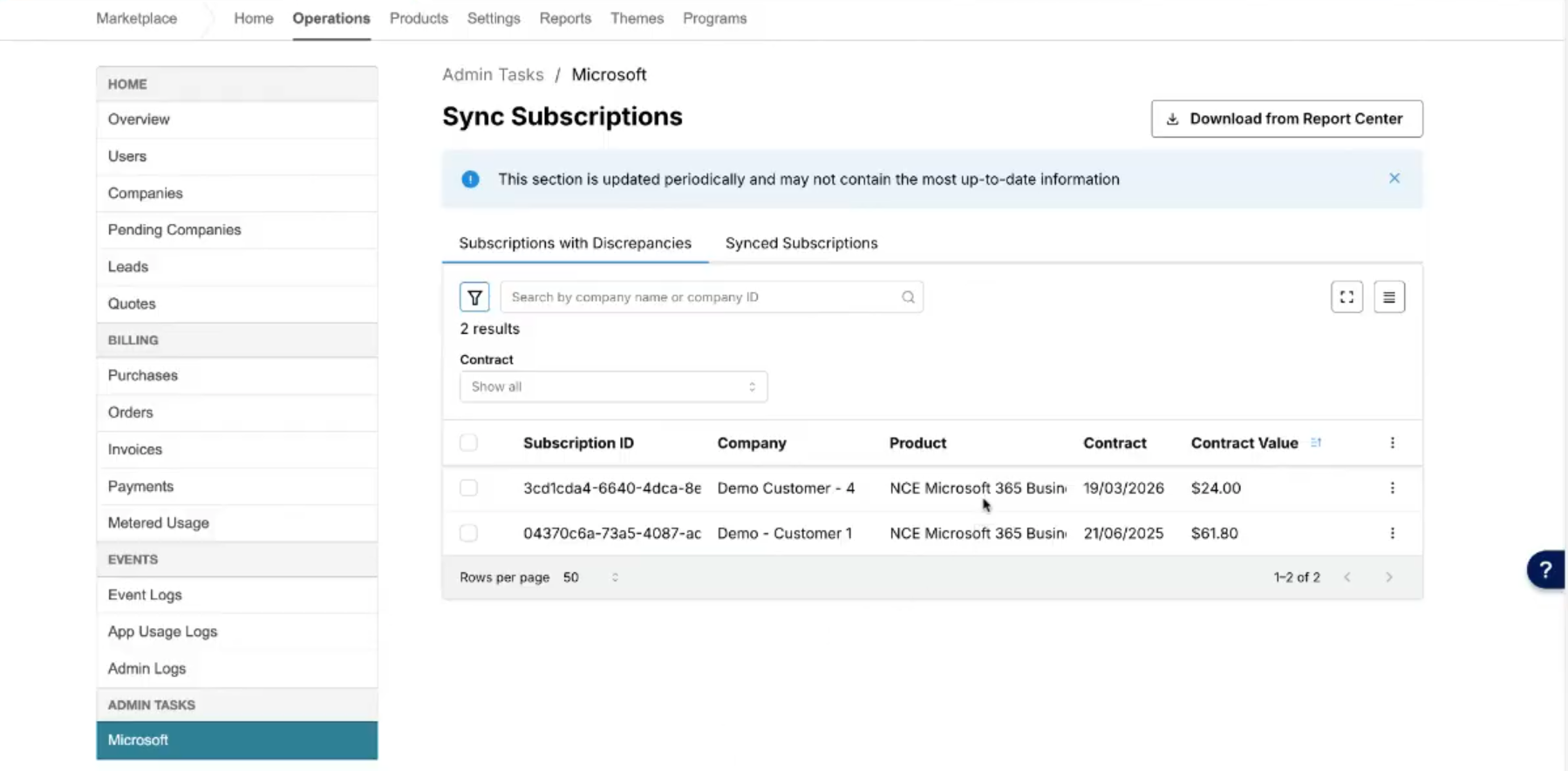
-
Click on a subscription on the Subscriptions with Discrepancies tab to view its attributes in detail. Subscriptions with discrepancies compared to Microsoft Partner Center data are highlighted in red for easy identification.
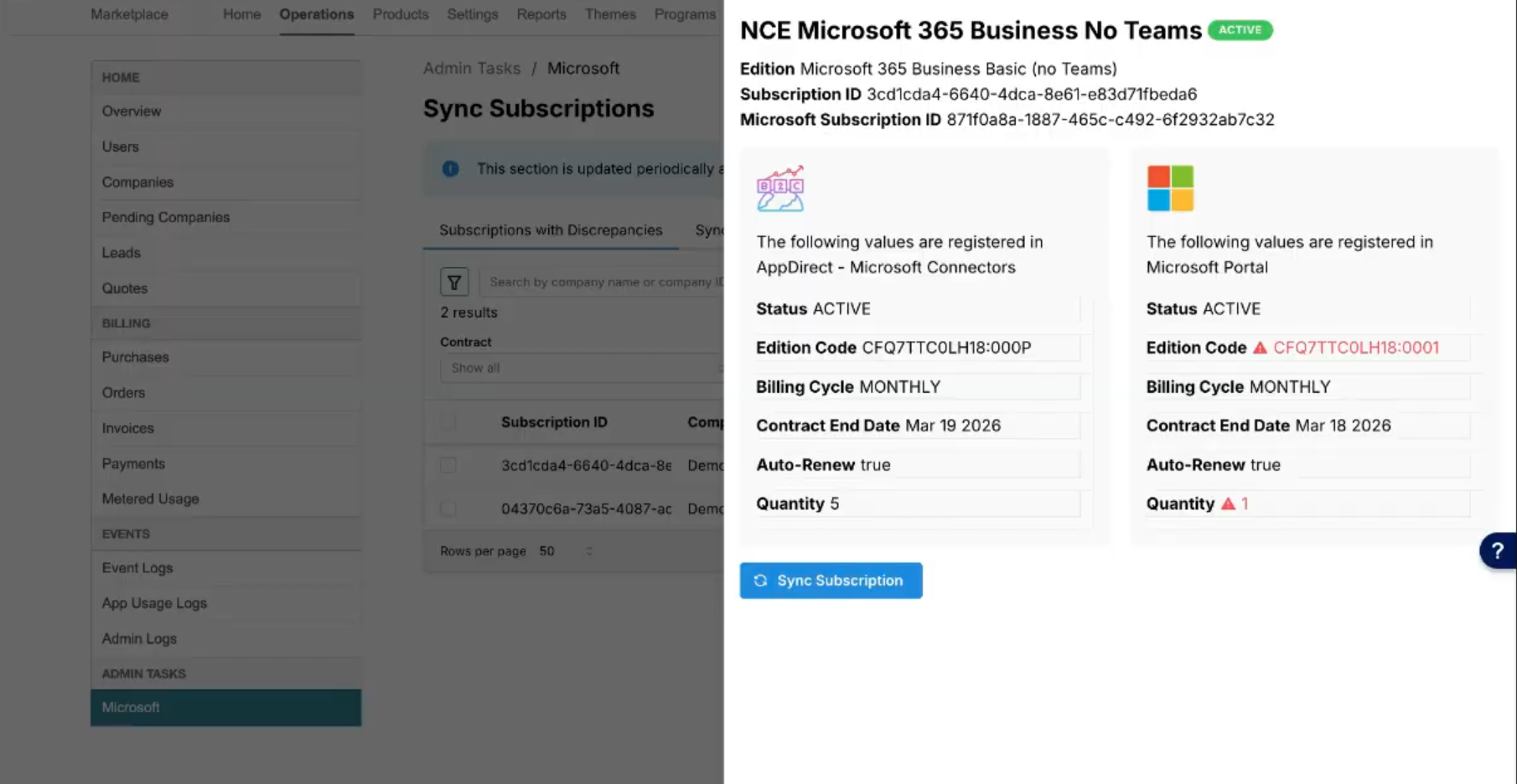
-
Click Sync Subscription. In the dialog that appears, type CONFIRM, and then cick Accept to proceed. The subscription is synchronized with corresponding data on Partner Center. If there are discrepancies, when you click Sync Subscription, the action performed depends on the discrepancy type identified for each subscription. The following actions may occur:
-
Soft cancel only: Removes the subscription from the marketplace. This action cannot be undone.
-
Migration only: Imports the correct data from Partner Center. Billing resumes in the marketplace once the migration is complete.
-
Migration and soft cancel: Soft-cancels the existing subscription, removes it from the marketplace, and then imports the correct data from Partner Center.
❗ **Important:**This capability is not available by default. Contact your AppDirect technical representative for more information. Also, this is a high-risk setting and will overwrite subscription data from Partner Center.
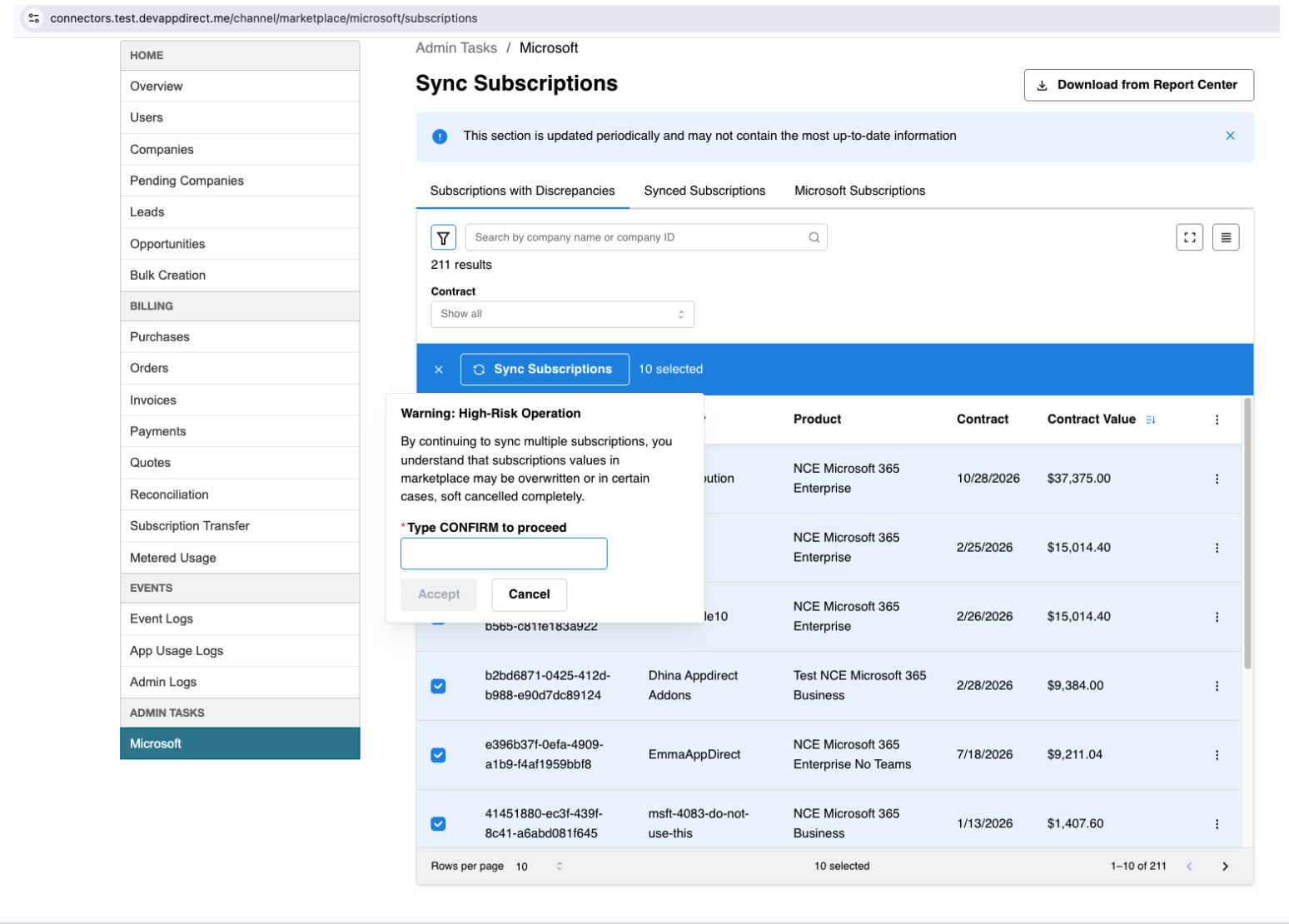
-
-
Click Synced Subscriptions to view the synchronized subscription.
When you use the Sync UI,
- Changes are applied only to the marketplace subscription; no modifications are made in Microsoft Partner Center.
- No invoices are generated as part of the sync.
- No webhooks, notifications, or events are triggered during the sync.
- Subscription changes (except renewal status) are not applied if either Microsoft or the marketplace is near the renewal date.
- If changes are applied to an existing contract, any scheduled change in the marketplace is canceled.
Reviewing discrepancy data using the UI
The Subscriptions with Discrepancies tab displays subscriptions where marketplae data does not match data in the Partner Center. This view helps you easily review discrepancies and decide what action is required. You can select a subscription to view detailed information and compare marketplace data.
The Discrepancy type filter allows you to select one or more types and focus on specific mismatch scenarios.
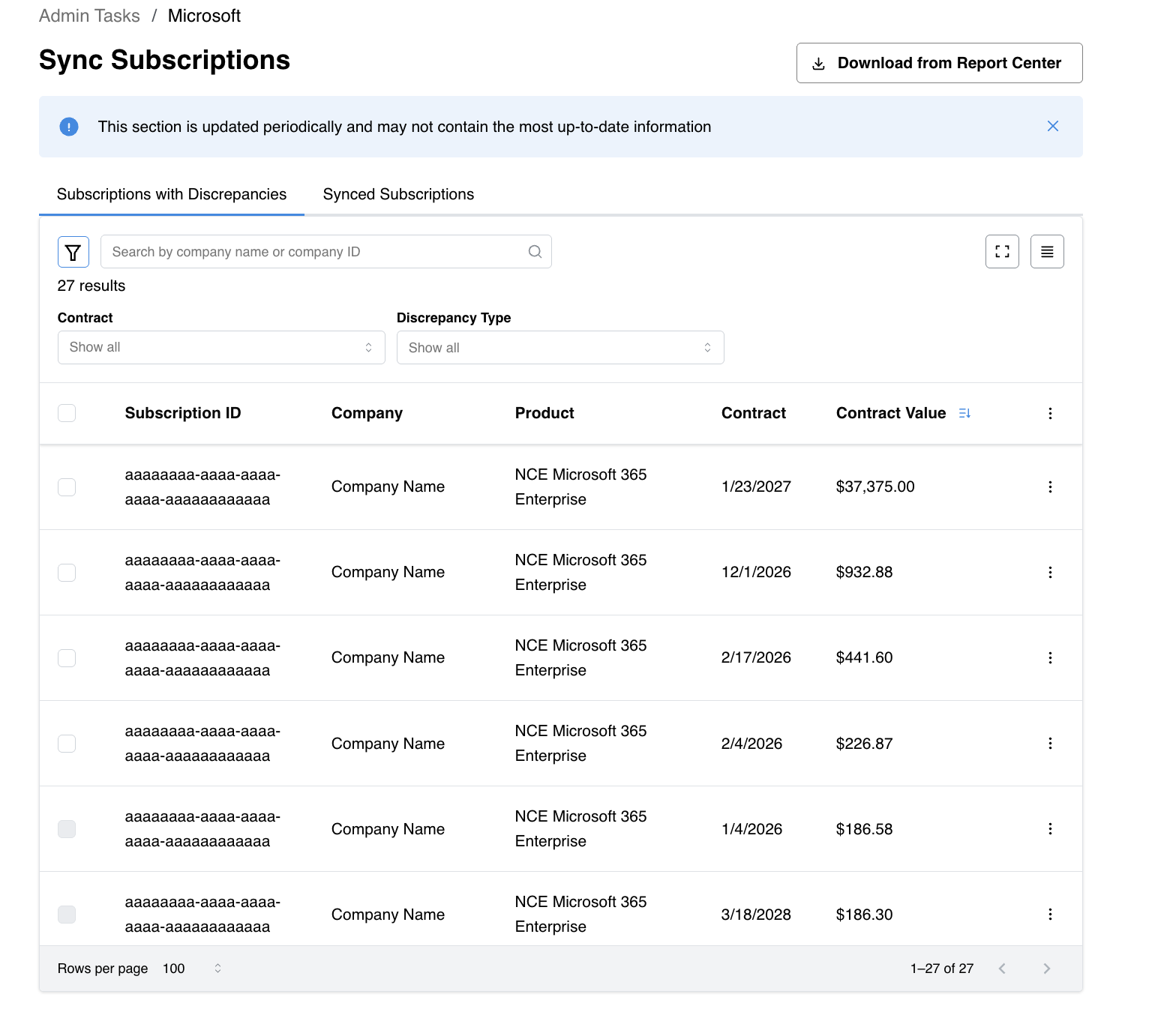
Reviewing discrepancy data using reports
You can review the complete discrepancy data across all Microsoft subscriptions using the Microsoft Discrepancy Report.
To generate the report,
- On the Sync Subscriptions page, click Download from Report Center. The Create Report page opens.
- Create a new report, provide a name, and select the report type as Microsoft Discrepancy Report.
The following discrepancy types are shown:
- AUTO_RENEW_MISMATCH
- BILLING_CYCLE_MISMATCH
- END_DATE_MISMATCH
- QUANTITY_MISMATCH
- STATUS_MISMATCH
- OFFERID_MISMATCH
Importing missing subscription data
Subscriptions with missing data appear in the discrepancy report with the attributeSUBSCRIPTION_NOT_ON_MARKETPLACE_MISMATCH. You can import these subscriptions into your marketplace from Partner Center. To import missing entries,
-
Click the Subscriptions with Discrepancies tab.
-
Click on a subscription entry with missing information.
-
Enter required information such as edition and subscription owner.
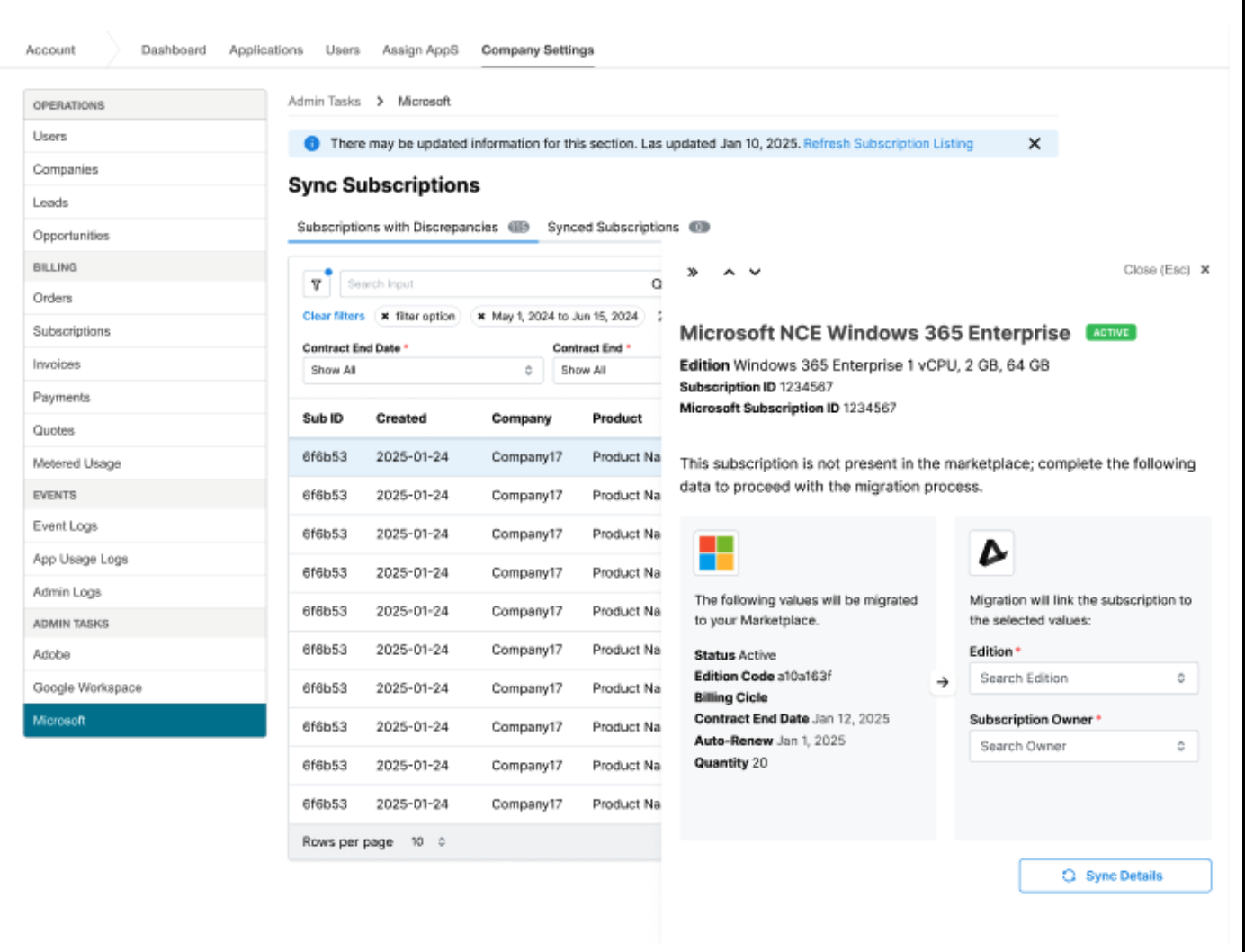
-
Confirm the action to import missing data. The platform checks for an existing company using the tenant domain or ID, prevents duplicate imports, and creates a new company if required.
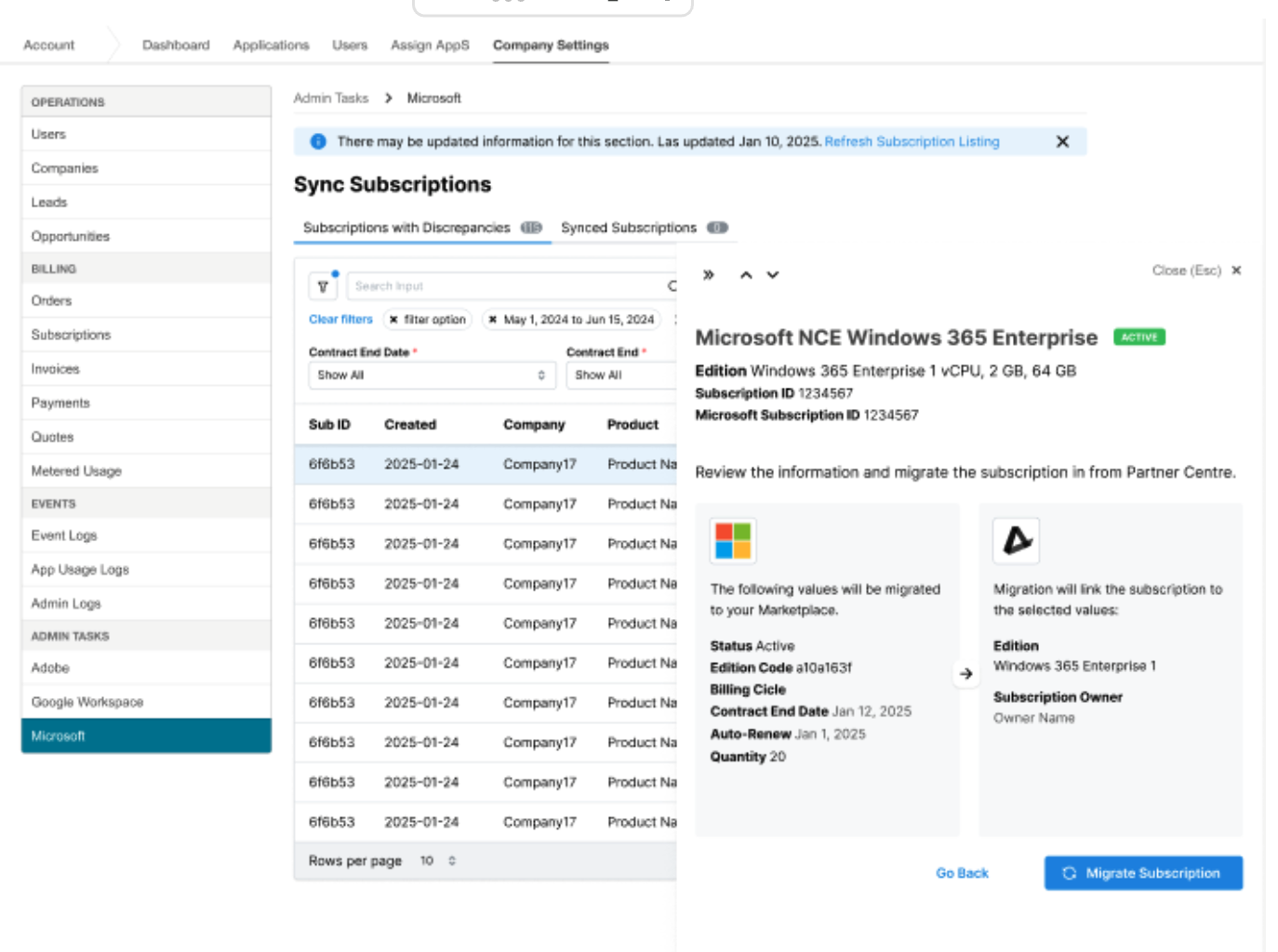
FAQs
-
Are subscriptions that exist in the Partner Center but not in the marketplace displayed in the Sync UI?
Not at this time. However, this capability is planned for a future update.
It will help identify subscriptions that need to be migrated into the Marketplace, such as those resulting from a Partner-to-Partner transfer. -
Why is there a discrepancy in the Contract End Date between Microsoft and AppDirect?
Yes, this can happen and is expected in some cases. The AppDirect platform intentionally adds a one day buffer to the Contract End Date in the Marketplace compared to the Microsoft Partner Center renewal date. This is because Microsoft may process renewals at any time within a 24-hour window on the renewal date. To handle this uncertainty, AppDirect uses a built-in buffer to ensure accurate behavior during renewals.
It’s important to note that Microsoft refers to this as the "Renewal Date," while AppDirect uses "Contract End Date". These dates are related but not identical.
If the Contract End Date in the Marketplace is not exactly +1 day after the Microsoft renewal date, it is flagged as a discrepancy. These should be resolved quickly to avoid issues with scheduled changes or cancellations, which could lead to unintended outcomes.
-
How should I handle different types of subscription discrepancies using the Microsoft Sync Tool
Each type of discrepancy should be handled based on your specific business context and customer relationship.
The Microsoft Sync Tool allows you to make changes to active subscriptions without notifying customers or triggering billing events immediately. This can have important implications, so it's essential to carefully review the impact of any updates before proceeding.
For example, adjusting seat quantities may change the customer's billing in the next cycle. You’ll need to determine how to handle any charges (under or over) for the prorated days and whether a separate one-time adjustment is necessary. In such cases, informing the customer of the change is recommended. Similarly, changing the contract end date may prompt customer questions, as it alters the perceived terms of their agreement. It's important to plan how these changes are communicated.
Was this page helpful?
Tell us more…
Help us improve our content. Responses are anonymous.
Thanks
We appreciate your feedback!